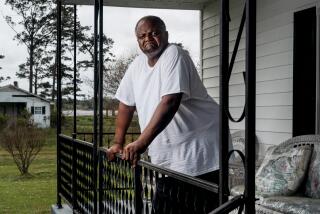109-Year-Old Homesteader Refuses to Leave His Land
- Share via
OCALA, Fla. — At age 109, Julius James wants to keep living on the land he has quietly farmed all his life, property he inherited from his slave ancestors.
But the state wants it for an interstate highway improvement project. And even though it has offered nearly $2 million, bought him a new house and told him to get out, James isn’t budging.
“I don’t want to move at all,” James said as he sat in his wheelchair on the porch of his clapboard house last week. “This is home.”
To relatives who live with him, James’ story is about an old man who should be allowed to die on his own land. To state transportation officials, it’s about family members who neglected an elder until his property became valuable.
To James, it’s about dirt and familiar oak trees.
“My land is important to me because I lived here so long,” he said, his voice low and scratchy. “In regards to how long I will live, I don’t know that. But I do know that I want to live the rest of my life on this piece of property.”
James raised cattle and grew peanuts on the land after inheriting it from his grandparents, Oliver and Queenie Habersham. Records are unclear, but the couple were slaves who bought or were given the land in 1868 after they were freed.
James’ eyes are clouded blue by cataracts, and he can no longer get around without his wheelchair and someone to push it. But his handshake is firm and his mind is clear.
In the last year, he has watched the O.J. Simpson trial--without reaching a verdict of his own--and attended the “Million Man March” with a nephew. But his life lately has been consumed with worry about the land, which was transformed from an isolated farming plot into valuable property when Interstate 75 cut through it in 1963.
The state had bought a patch of land from James for the interstate, but in the late 1980s realized that it needed more for a new ramp. It was willing to pay almost $2 million for 21 acres, and word of the project increased the value of James’ remaining 39 acres.
But ownership of much of that remaining property is in dispute, one reason that James may not be able to live elsewhere on his farm if the ramp is built.
One caretaker had persuaded James to sign over six acres and write him into his will. And at age 103, James signed a contract selling a large parcel to a Kansas City truck-stop developer.
Those agreements are being challenged in court.
Gussie Anderson, a 77-year-old retired nurse and James’ niece, heard about the contracts and moved from Philadelphia to live with him. She lives in his house with her daughter and her great-grandchildren, ages 6 and 11.
Anderson has spent the last two years bathing and clothing James daily--giving him medicine, cleaning his eyes, changing his diapers. No one has disputed the quality of her care.
But earlier this year, a court refused Anderson or any other family member guardianship of James, citing fears that they were trying to take advantage of him.
State transportation department spokesman Steve Homan said no family members were interested in James or his land until the department needed it for the expansion project.
The department has deposited $1.9 million with the court to pay for the land, but now there are more than 50 relatives who want some of it. A bank has launched a title search. “We want what’s best for Mr. James and what’s best for the taxpayers,” Homan said. “We’re the only ones to show any compassion for Mr. James.”
Last week, Circuit Judge William Swigert ordered James to move by Monday to a new, $52,000 handicapped-access home that the state purchased in a subdivision about half a mile away.
Michael Brown, a lawyer hired by James’ relatives, is appealing the ruling, saying the old man could die if moved.
“This issue doesn’t have to do with money,” Brown said. “It has to do with living out the rest of his life on his land.”
More to Read
Sign up for Essential California
The most important California stories and recommendations in your inbox every morning.
You may occasionally receive promotional content from the Los Angeles Times.












